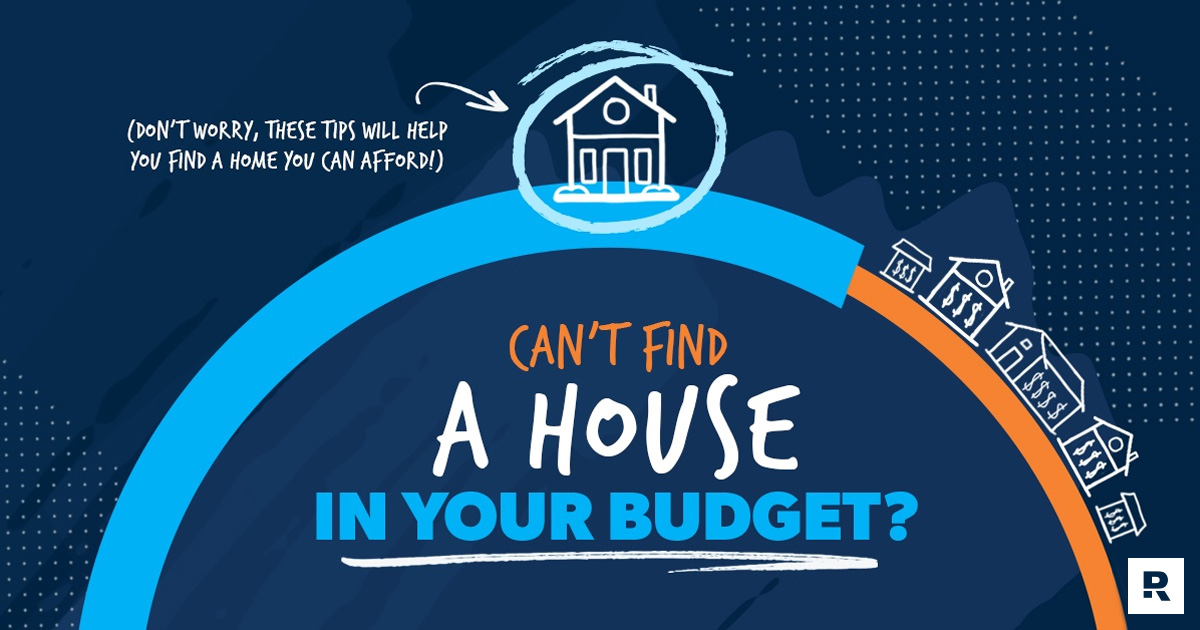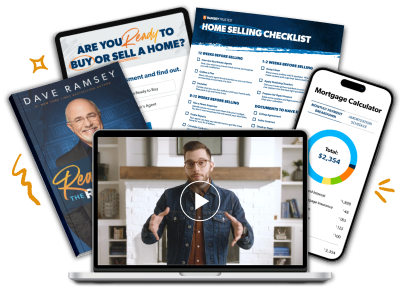What to Do When You Can't Afford Your Housing Market
10 Min Read | Aug 22, 2024

Okay, so you probably don’t need me to tell you how expensive the real estate market has gotten. After all, the median home listing price in the U.S. has jumped to $424,900—an increase of over $100,000 from just four years ago.1 That’s crazy!
If you’re thinking about buying a home but you’re frustrated by prices and interest rates and wondering, How are people affording houses? you’re not alone. Don’t let that frustration cause you to give up on the dream of homeownership, though, because it is still possible—and you don’t have to bust your budget to make it happen.
Now, it will take a lot of patience and discipline. We are talking about a big price tag here, and saving that kind of money doesn’t happen overnight. But if you’re willing to put in the work, you can become a homeowner even when it feels like you can’t afford the housing market.
Here’s how to afford a house.
What to Do When You Can’t Afford the Housing Market
Option 1: Pay Off Your Debt
I know that telling people they should be debt-free before buying a house isn’t the most popular advice out there. But here’s the truth, you guys: The main reason lots of people can’t afford to buy a house is because way too much of their paycheck every month is going toward payments on cars, student loans, credit cards, or all of the above.
Let’s crunch a few numbers to see why that’s such a problem. The average payment for a new car is over $700, and the average student loan payment is nearly $400.2,3 That means the typical person driving a car they bought brand new off the lot who also has student loans is spending $1,100 a month just on debt payments. That’s insane!
When you’re already making such big payments every month, it’s almost impossible to fit a house into your budget. That’s why focusing on paying off your debt before buying a house is such a good idea—it’s a major step toward making homeownership more affordable.
To get started, list your debts from smallest to largest, regardless of interest rate. Then, start putting as much money as possible toward your smallest debt every month while making minimum payments on the rest—we call this the debt snowball.
Once your smallest debt is gone, take what you were paying on it and add that to your payment on the next-smallest debt until it’s gone too. Repeat the cycle until each debt is paid in full and you’re completely debt-free!
Option 2: Relocate to a More Affordable Area
Another option if you can’t afford your housing market is to move to a different one. Believe me, I know moving to a new city can be scary, especially if you’re comfortable right where you are. But if buying a house is really important to you, you may have to face your fears and get a little uncomfortable.
Luckily, you may not have to move very far to see a major discount in the cost of buying a house. After all, lots of expensive major metropolitan areas have much cheaper cities or suburbs within an hour’s drive.
Take my hometown of Nashville for example, where the median home listing price is around $640,000. While that’s a super high number, you can find much more affordable houses in nearby cities like Murfreesboro ($480,000 median listing price), Columbia ($440,000), and Goodlettsville ($450,000).4
A longer commute may be inconvenient, but it may also be your ticket to affording a home. You can ask a real estate agent for advice about how to target your search to areas you can afford.
Option 3: Increase Your Income
You can also make homeownership more affordable by increasing your income. After all, if the amount of money you have coming in each month goes up, the amount you can afford to spend on a home also goes up.
See how much house you can afford with our free mortgage calculator!
There are all sorts of ways to increase your income. Some of the best are . . .
- Getting a side hustle
- Increasing your hours or working overtime
- Adjusting your tax withholdings (if you usually get a big refund)
- Finding a new job
If you’re planning to increase your income by finding a new job, figure out the minimum salary you’ll need to buy a house before you start your search. Your monthly house payment (including principal, interest, insurance and HOA fees) should be no more than 25% of your take-home pay. I recommend this percentage so you’re not house poor when most of your paycheck goes toward the mortgage.
Your All-in-One Real Estate Resource
Find everything you need to help make confident decisions and reach your home goals.
Option 4: Keep Saving Money
Because home prices are so expensive these days, it’s going to take longer to save up enough money to buy a home. And you know what? That’s okay. It’s much better to rent for a while and get in a good place with your money than to have a house consume your whole world.
And there’s no shame in renting, guys. It helps you build up your savings—and patience. Plus, you get to call the landlord when something breaks instead of spending your hard-earned money to fix it!
If you want to buy a home in a pricey market, waiting and continuing to save money may be your smartest move. Your area may seem more affordable three years from now when you have a hefty down payment saved!
By the way, you should also save up a full emergency fund worth 3–6 months of your typical expenses before buying a house. This is in addition to the amount you save for a down payment.
Here's A Tip
The biggest key to saving money is making (and sticking to) a detailed monthly budget, and the best way to do that is with the EveryDollar app. It’s what I use to keep track of my budget, and you can download it for free.
Option 5: Reset Your Expectations
Another option is to revisit your must-have list. A remodeled four-bedroom Craftsman home on an acre lot might be out of your price range, so think about what you can change. A three-bedroom home, a half-acre lot, or a ranch-style house that needs a little work could be a perfect fit for your budget.
And remember, your first home won’t be your forever home. It doesn’t need to have everything on your wish list because you’re probably going to move eventually anyway.
Letting go of the idea of a luxury kitchen or gleaming hardwood floors might be tough, but it’s worth it to avoid getting in over your head financially. Don’t forget, you can always upgrade your home’s features down the road.
When you work with a real estate agent to get your expectations in line with what you can afford, you’ll be surprised to find out you still have some great options!
What Not to Do When You Can’t Afford the Housing Market
Some people, specifically first-time home buyers, manage to afford a house by taking advantage of “creative” financing (aka terrible mortgage options, like VA and FHA loans) or spending way too much money. That may be how some people are buying houses right now, but don’t do it!
Buying a house you can’t actually afford puts you on the fast track to going broke. When you really want something, logic sometimes goes out the window. And I know you might really want a house right now. But don’t let that blind you into making a big financial mistake—like buying a home you can’t afford. Or even worse, falling for terrible programs like rent-to-own, seller financing, or an adjustable-rate mortgage.
Stay far away from those, and above all, stick to your budget!
Defining Your Financial Boundaries
Before you look for homes, you have to know how much house you can really afford. That number should be based on your financial situation, not pressure caused by the rising prices in your housing market or what might be trending on social media.
If you can’t pay cash for your home, the next best option is getting the right mortgage loan. Follow these guidelines:
- Choose a 15-year fixed-rate conventional loan—the cheapest, quickest type of mortgage to pay off.
- Keep your monthly payment to no more than 25% of your take-home pay.
- If you’re a first-time home buyer, put at least 5–10% down. But 20% or more is even better because you’ll avoid paying PMI!
- Pay for closing costs and moving expenses with cash.
Our free Mortgage Calculator can help you figure out the home prices that’ll fit your budget. And if you’re married, make sure you and your spouse are on the same page about what you want in a house.
Then be prepared: A lender will probably approve you for a much higher amount than you can afford. But just because you qualify for more money doesn’t mean you can afford to take it. Stick to the 25% rule, and you’ll be golden.
Once you know what affordability looks like for you, share your boundaries with your real estate agent. And don’t budge, guys! (Remember, they work for you.)
Get a Real Estate Game Plan With Dave’s New Book
Learn Dave Ramsey’s roadmap to buy, sell and invest in real estate the right way, so your home can be a blessing, not a burden.
What to Think About When Buying a House (by Age)
Okay, first, I want to be very clear: No matter how old you are, I always recommend the same home-buying financial boundaries we just looked at. But let’s face it—life changes pretty fast. One day, you’re young and carefree. The next, you’re cruising along in a minivan singing “Hakuna Matata.” And soon after that, you’re at your own retirement party.
So, let’s talk about what affording a house looks like for your generation—and how you can use your stage of life to your advantage.
Baby Boomers
As a baby boomer, you might be looking for a house because you want to downsize or move closer to your adorable grandkids. You have a huge advantage in the housing market because you’ve had a lifetime to build up equity in your current house. You can use that equity wisely by selling your current home and paying cash for something smaller.
Don’t have much (or any) equity? Think carefully about how you plan to pay for your new home. After all, you don’t want your mortgage to take up too much of your income—or keep you from retiring.
Generation X
You’re about halfway through your career, the kids are growing up and heading off to college or trade school, and it feels like the right time to move.
The best part is you’ve got 10–20 years left in the workforce, so you can comfortably pay off a 15-year mortgage just in time for retirement! The trick here is to make sure your new home doesn’t put your financial future at risk. You should still put yourself in a good position to retire—without risking the kids’ college funds.
Millennials
Millennials are building their careers and families. You might feel like you’ll never be able to afford a house by the time you’re done paying for groceries and diapers. But you can. Your generation is now the backbone of the American workforce—so you’ve got tons of opportunities to earn money and save for a home.
Your earning power is a huge advantage, but keep in mind, it doesn’t mean you have to buy right now. Don’t rush into a purchase you feel pressured to make. First, take control of your money—then you’ll be able to afford a house.
Generation Z
Okay, I’m super impressed you’re already thinking about how to afford a house! Your biggest advantage is you’ve got loads of time, which is a good reason you shouldn’t buy just yet. It’s smart to wait until you have a good idea where your career, spouse and passions might take you.
But you can start taking steps to buy a house in a few years. The best way to do that is by paying off your debt, saving up a strong down payment, and choosing an affordable area to live in.
You’ve Got This!
Like I said earlier, it’s really easy to feel hopeless when you look at how expensive homes have gotten over the last few years. But if you use these strategies and stay within the boundaries we just went over, you can make homeownership part of your future. I’m cheering you on!
Next Steps
1. Start saving up a strong down payment and use the free EveryDollar app to track your budget every month.
2. Get our free Down Payment Guide to take an even deeper dive into how you can make homeownership more affordable.
Frequently Asked Questions
-
Will Gen Z be able to afford a house?
-
Yes! Even though home prices are high, members of Gen Z can still afford a house. In fact, over a fourth of adult Gen Zers in America already owned a home as of 2023.5
-
How can the average person afford a house?
-
The average person can afford a house by choosing an affordable area to live, saving up a strong down payment, and paying off all their debt to make sure they have plenty of margin in their budget.
-
Why can’t we afford homes anymore?
-
Home prices in the U.S. have gone up by over $100,000 since 2020, and that’s made homeownership too expensive for a lot of people. But you can still afford a home if you’re patient. Take a few years to pay off your debt and save up a strong down payment.



